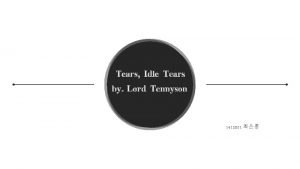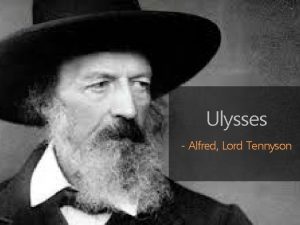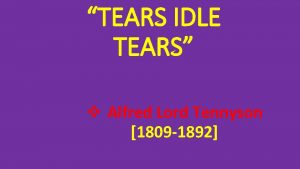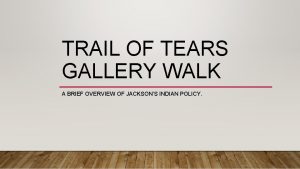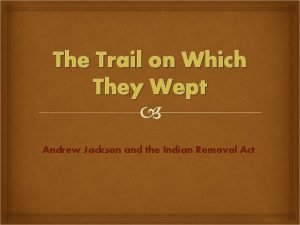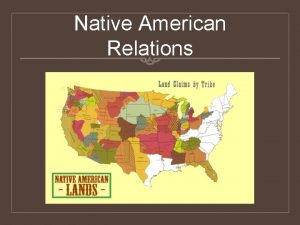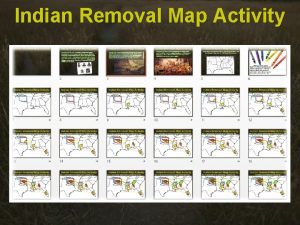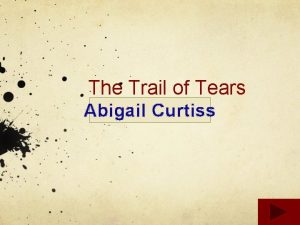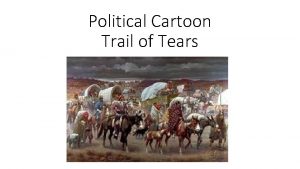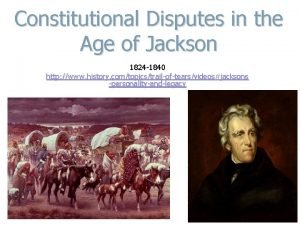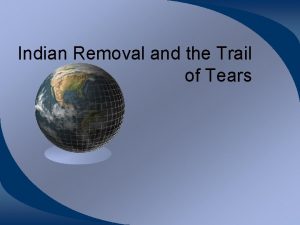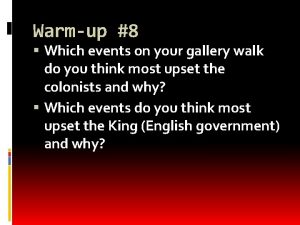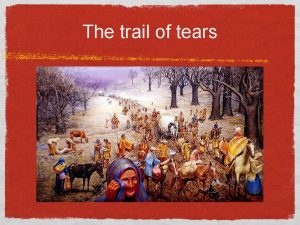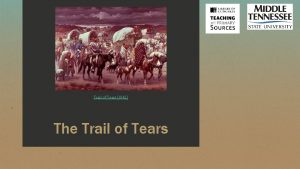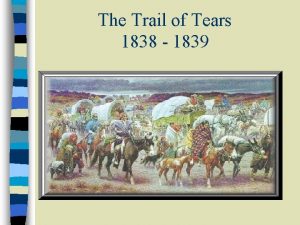Walk the Trail of Tears Gallery Walk Unit




















- Slides: 20

“Walk” the Trail of Tears Gallery Walk Unit 7 – The Nation Expands

What was the Trail of Tears? 1. 2. 3. • • • Who let it happen? Why did it happen? What were the effects of this event on Various Native American Groups? Settlers moving into the west? The United States Federal government?

Date Events Early US General Andrew Jackson* defeated 1800 s the Creek Indians of the southeast (*This is before his War of 1812 Fame) He forced them to give up vast amounts of land in Georgia and Alabama The Cherokees had already established an independent Cherokee Nation with a written alphabet and a constitution.

Date Events 1830 Congress passed the Indian Removal Act, proposed and signed by Jackson Its purpose was to remove tribes from fertile lands east of the MS River The deal was that the Cherokees, Creeks, Choctaws, Chickasaws, and Seminoles would trade their old land for new lands west of the MS River Federal government would provide money, arms, and supplies for one year Most of the tribes reluctantly signed. The Cherokees did not.

Date 1831 Events Georgia wanted state governmental control over the Cherokees and their lands, since the Cherokees rejected the deal with the US government. The Cherokees took their case to the GA Supreme Court, but the GA state Supreme Court refused to hear the case of the Cherokee Nation v. Georgia.

Date Events 1832 In the case of Worcester v. Georgia, the Supreme Court ruled in favor of the Cherokees as a sovereign nation. Jackson supposedly said, “John Marshall (Chief Justice) has made his decision. Now let him enforce it. ”

Date 1835 NO! Events A small minority of Cherokee agreed to move out of their ancestral lands and signed a treaty with the U. S. The majority of the Cherokee chiefs were not involved in the treaty negotiations and refused to leave their lands and homes.

Date Events 1838 Based on the treaty, the U. S. Army began the forceful removal of the last southern tribe east of the MS River to Indian Territory (now Oklahoma). The Trail of Tears - The Cherokees were forced to leave their farms and cattle and move overland in the winter to their new lands. About 4, 000 died on the move because of lack of food, freezing weather, and disease. 18381839



Date Events 18171818; 1835 -42; 1858 Led by Chief Osceola, the Florida Seminole tribe fights the US Army three times because they do not want to leave their homes In 1858, the Osceola and the Seminoles had to give up and were forced to move to Indian Territory (now Oklahoma)

A. What made Cherokee culture unique and significant?

B 1. What deal did Congress offer to various Native American tribes? B 2. What were their responses?

C. Explain how the Cherokees took their case to the US Supreme Court.

D. Compare the Supreme Court’s ruling to the President’s reaction.

E. How did the Cherokee react to the government’s demands for removal?

F. How did the forceful removal come to be known as the “Trail of Tears? ”

Examine the Picture G. Identify people, objects, and activities in the photograph and briefly describe each.

H 1. What does this map show? H 2. What do the black lines with arrows represent?

I. Compare & Contrast what happened to the Seminoles to the experiences of the Cherokee.
 Tears idle tears
Tears idle tears No tears in the writer, no tears in the reader meaning
No tears in the writer, no tears in the reader meaning Tears idle tears 해석
Tears idle tears 해석 Ulysses 해석
Ulysses 해석 Tears idle tears themes
Tears idle tears themes Tears, idle tears
Tears, idle tears Trail of tears worksheets
Trail of tears worksheets Andrew jackson trail of tears quote
Andrew jackson trail of tears quote Andrew jackson trail of tears map
Andrew jackson trail of tears map How many native americans died on the trail of tears
How many native americans died on the trail of tears Indian removal map
Indian removal map Trail of tears
Trail of tears What states did the trail of tears go through
What states did the trail of tears go through Political cartoon trail of tears
Political cartoon trail of tears Trail of tears
Trail of tears Trail of tears
Trail of tears Gallery walk instructions
Gallery walk instructions Market structures gallery walk answers
Market structures gallery walk answers Gilded age gallery walk
Gilded age gallery walk Causes of the american revolution gallery walk
Causes of the american revolution gallery walk 5 themes of geography posters
5 themes of geography posters
